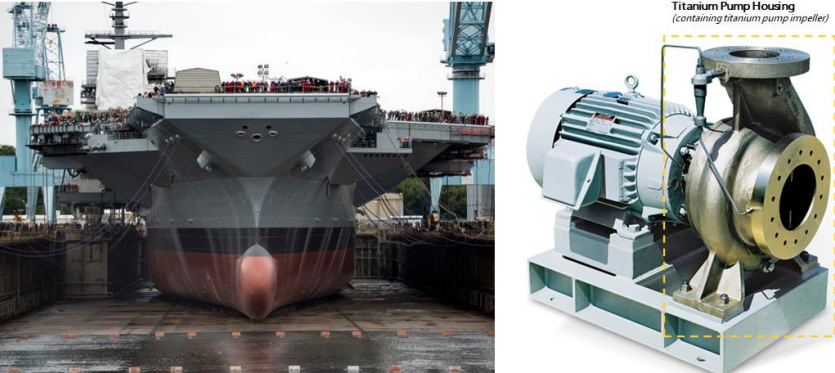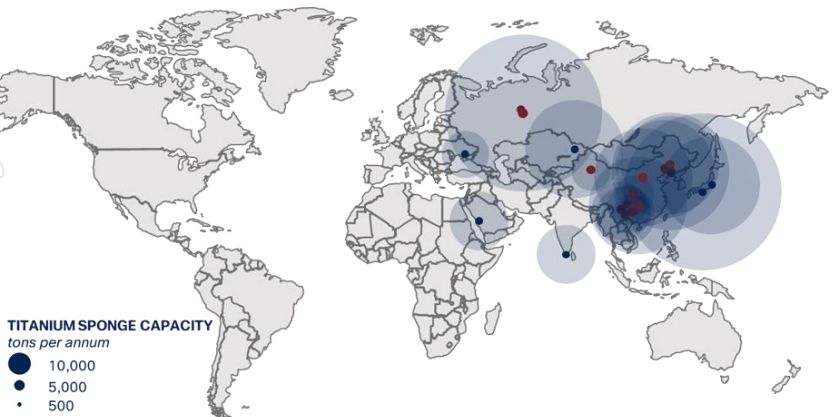Titanium alloy producer IperionX and ISO 9001:2015 certified pump manufacturer Carver Pump, have joined forces to provide additively manufactured titanium pump parts to the US Navy. Carver will develop these parts, guide IperionX through the prototyping process, and oversee the qualification process.
The Naval Sea Systems Command (NAVSEA) of the United States Navy has created additive manufacturing techniques for over 500 approved components used in US submarines and ships. The Governor of Virginia and the US Navy are intensifying their efforts to expand AM, having recently inaugurated the ‘Additive Manufacturing Center of Excellence’ in Danville, VA, which is only twenty-five miles from IperionX’s new Titanium Demonstration Facility.
“In just four months, we’ve seen dynamic progress from IperionX,” said Glenn Youngkin, Governor of Virginia. “As they continue to develop synergies with Carver Pump and the US Navy using 100% recycled titanium scrap as feedstock which will soon be produced in Halifax County, we look forward to seeing IperionX’s continued growth and success.”
“We see this partnership as the first step in a larger relationship focused on both Navy surface ships as well as new parts for other marine applications,” said Andrew Carver, CEO at Carver Pump.

Why choose IperionX for the production of titanium parts?
IperionX highlights that titanium casting is a very expensive manufacturing technique and can present significant issues due to two primary reasons titanium’s high melting point (1,670°C) and high reactivity with oxygen. To prevent unwanted reactivity, titanium must be specialized vacuum melted and then poured into specifically designed ceramic molds.
However, the United States currently lacks the domestic capability to produce the large titanium castings needed for high-performance centrifugal pumps, resulting in lengthy lead times for new pump parts procured from a foreign-controlled supply chain. These specialized titanium pump elements can be additively manufactured using IperionX’s lower-carbon, US-based titanium powders. The US Navy will be able to significantly cut lead times for critical components, boost equipment availability, and sustainably re-shore a vital US titanium metal supply chain, consequently.
IperionX’s titanium production pilot facility in Utah is actively developing high-quality titanium metal powders from 100% reprocessed titanium feedstocks for client qualification. Reportedly, this titanium manufacturing facility has accomplished processing yields reaching 100% from low-grade scrap without the necessity of combining it with high-grade primary titanium metal.
“Our partnership with Carver is another important milestone for the rapid commercialization of IperionX’s breakthrough titanium technologies,” said Anastasios (Taso) Arima, IperionX CEO.
Furthermore, titanium centrifugal pumps are chosen by the US Navy for their “exceptional” corrosion resistance, efficiency, and durability in demanding naval applications. Fire suppression, radar and electronics cooling, seawater cooling, desalination, main propulsion seawater, and bilge all rely on these pumps.
Since World War II, Carver has supplied high-performance centrifugal pumps to the US Navy. All existing Navy shipbuilding programs, such as Aegis Destroyers, Ford Carriers, Zumwalt Destroyers, America Big Deck Amphibious Assault Ships, Virginia Submarines, Littoral Combat Ships, and San Antonio Amphibious Transport Docks, use Carver pumps.
“We are delighted to be working with IperionX to help introduce domestically sourced, 100% recycled titanium into the US Navy’s supply chain. When coupled with the benefits of Additive Manufacturing, the partnership provides a significant potential to benefit Navy operations through the rapid production of complex, operation-critical titanium parts, providing a potential reduction in lead times and increasing equipment availability,” added Carver.
“These patented technologies can efficiently recycle domestic titanium scrap metal at a lower cost than existing processes, and this high-quality titanium metal can be used for a range of manufacturing technologies, including Additive Manufacturing. We look forward to working closely with Carver to rapidly prototype and deploy titanium components for a wide range of centrifugal pump applications in US Navy platforms,” added Arima.
IperionX reshoring US titanium parts
IperionX is actively involved with the US Navy to detail the firm’s plans to re-shore the US titanium distribution network in a sustainable manner, with the goal of reducing critical titanium part cost, carbon emission, and lead times.
Senior leadership from NAVSEA, along with the Office of the Chief Engineer for Ship Design, Integration, and Naval Engineering, the Shipbuilding Industrial Base Task Force, and the Program Executive Office – Strategic Submarines, participated in these discussions. IperionX has also discussed the possibility of reprocessing titanium scrap inventory for use throughout the Defense Industrial Base with the US Defense Logistics Agency Strategic Materials agency.
IperionX is also working with the Naval Air Systems Command to generate flight-critical additively manufactured titanium parts for Navy aircraft. These discussions follow IperionX’s victory in the US Air Force Research Laboratory’s titanium recycling Grand Challenge, and they highlight the importance of re-shoring a US titanium supply chain for allied and domestic defense industries.
To improve operational readiness, NAVSEA has publicly declared goals for developing technical guidelines for additive manufactured parts. These aim to produce obsolete and long-lead-time parts, as well as to improve defense capabilities by producing novel component designs that would not be possible otherwise.

Metal AM powering the defense sector
Recently, Australian large-format 3D printer manufacturer AML3D, announced the sale of a large-scale, industrial ARCEMY ‘X-Edition 6700’ Wire Arc Additive Manufacturing (WAAM) metal 3D printing system for assisting the US Navy’s advancing integration of WAAM technology. WAAM, according to the firm, is critical for rapidly boosting parts supply to the US Navy’s submarine industrial base. The ARCEMY order was placed by BlueForge Alliance, a US Department of Defense intermediary, with the goal of assisting in the acceleration of enhanced manufacturing methods throughout the US defense industrial base.
Furthermore, the US Navy installed its first Phillips Additive Hybrid metal 3D printing solution on board, which was powered by metal 3D printer developers Meltio and Haas. The Phillips Additive Hybrid powered by Haas combined Meltio’s laser metal deposition technology with the Haas CNC vertical machining centers that control the mill on the USS Bataan ship. Rear Adm. Brendan McLane, the Commander, of Naval Surface Force Atlantic, said, “The introduction of additive manufacturing (AM) into naval operations supports readiness and self-sufficiency.”
What does the future of 3D printing for the next ten years hold?
What engineering challenges will need to be tackled in the additive manufacturing sector in the coming decade?
To stay up to date with the latest 3D printing news, don’t forget to subscribe to the 3D Printing Industry newsletter or follow us on Twitter, or like our page on Facebook.
While you’re here, why not subscribe to our Youtube channel? Featuring discussion, debriefs, video shorts, and webinar replays.
Are you looking for a job in the additive manufacturing industry? Visit 3D Printing Jobs for a selection of roles in the industry.
Feature image shows USS Gerald R Ford in dry dock in Newport News, VA & Carver Pump M-Series ASTM F998 close coupled centrifugal pump. Image via IperionX.


